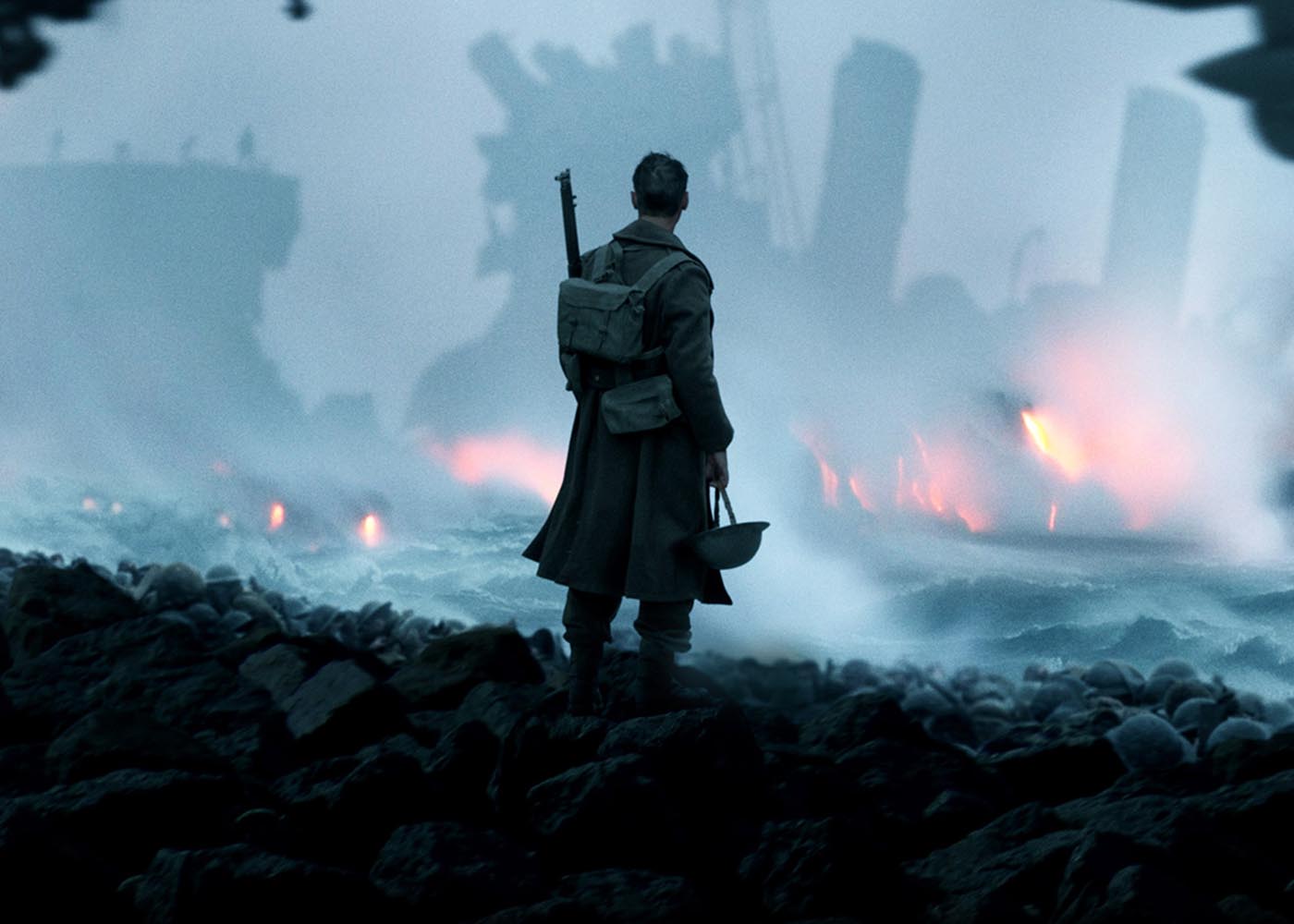This content has been archived. It may no longer be relevant
The quietest moments of Dunkirk can be found within the opening few frames, as Nazi propaganda leaflets drop from the air into the streets of Southern France, warning our blockaded soldiers that there’s no escape from the advancing Germans. It’s unsettlingly serene. Then Hans Zimmer winds up the rat-a-tat soundtrack, a ticking clock audio accompaniment to a film which feels like watching the inner workings of a timepiece build up to a wonderfully synced crescendo, and it’s non-stop from there. Nolan has always been fascinated with time, the format of which he plays with brilliantly here, and Dunkirk is as masterfully constructed as the most complex machinery.
Weaving three separate narrative threads into a gut-punch run time of 106mins, Nolan’s script drops us into the green slacks of Tommy (Fionn Whitehead), whose perpetual motion has carried him onto the beaches of Dunkirk. It’s here that 400,000 men are awaiting evacuation by a diminished military force from back home; ships are arriving one-at-a-time, and there are only three Spitfires travelling across the English Channel. One of these is piloted by Farrier (Tom Hardy), who along with his wingman, Collins (Jack Lowden) is heading to the beaches to protect the queuing masses. The third leg of this triumvirate is the crew of a small boat, captained by Mr. Dawson (Mark Rylance), that is braving the swell to join hundreds of civilian vessels coming to the rescue.
Their fates, along with 400,000 men, are played out in an intimate fashion against an epic canvas, in such a way that you’ll feel the wind whip your face, gasp for breath with characters on the cusp of drowning, or duck and weave at the technical bravado and practical effects of the cockpit dogfights. It’s a dizzying maelstrom of scenarios, and the most intense depiction of warfare since the opening of Saving Private Ryan.
Dunkirk feels like a symphony, with a series of movements that ebb-and-flow towards a climax, and with Hans Zimmer on-board to compliment this overriding feeling, getting under your skin with a chest thumping score, the film has a rather unique way of washing over you like a beautiful murky tide.
Adjusting to the language of Dunkirk might prove difficult, with minimal dialogue, meaning you’re immersed in mood over plot. It really could work as a silent movie. Coupled with zero exposition, and no voiceover, which is a trope that war movies often exhaust in order to substitute character development, you’re left to gather what snippets you can about each of the battle pawns, as much like Whitehead’s Tommy, you’re thrown into different environments without much warning.
As such, it’s hard to really assess performances. Whitehead is our over-the-shoulder soldier, determined to get off the beach no matter what. Refreshingly, his actions are sometimes morally dubious, but he’s often reduced to being a plot device for forward momentum. Hardy has fewer lines than he did as Bane, and about the same amount of time with his face covered, but you can’t escape the ‘tally-ho’ heroic aura he brings to the role. For many the talking point will be Harry Styles, who makes an impressively assured debut with a performance that involves a fair chunk of the dialogue.
However, the real heart of this tale can be found with Rylance and his young shipmates. Afforded the most complete arc, and integral to the way in which the story ties itself up in the end, they fly in the face of anyone who suggests Nolan cannot do emotion. Dunkirk is a war movie, it’s going to be bleak, and cold, but in Rylance there’s a performance that brings a tide of emotions with his final reel actions.
Image: Warner Bros
Summary
The overt craftsmanship might capsize the film for those expecting a more familiar tale from the frontline, because Dunkirk is quite unlike anything the genre has had to offer. Think The Thin Red Line, but with more immediacy and just plain old showing off. This is meticulously spectacular filmmaking, further cementing Nolan’s reputation as the finest auteur of his generation.


